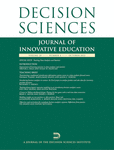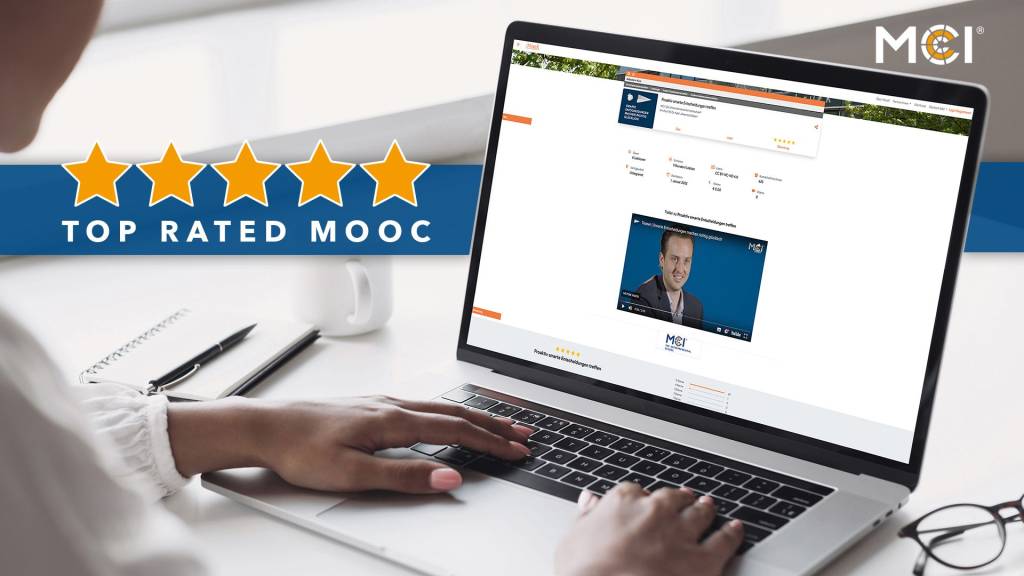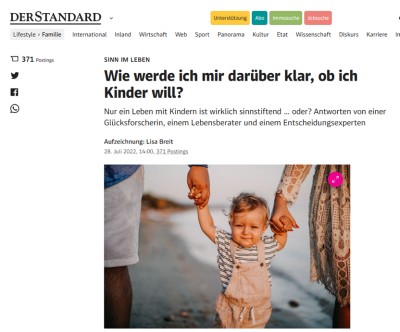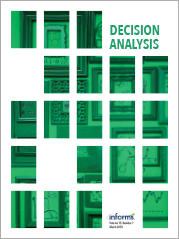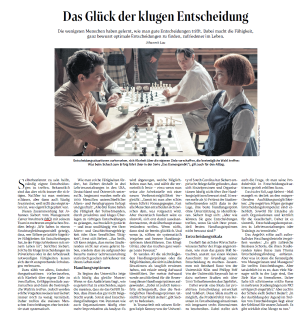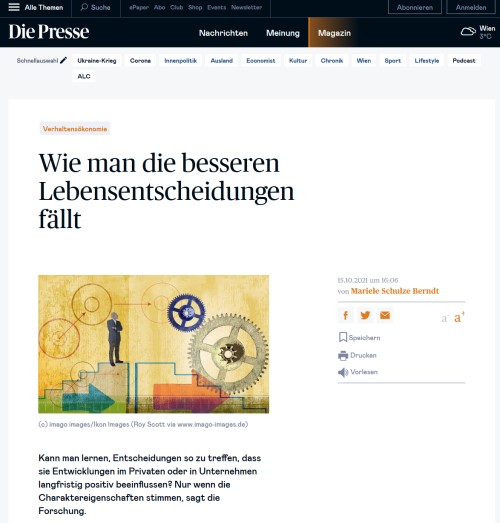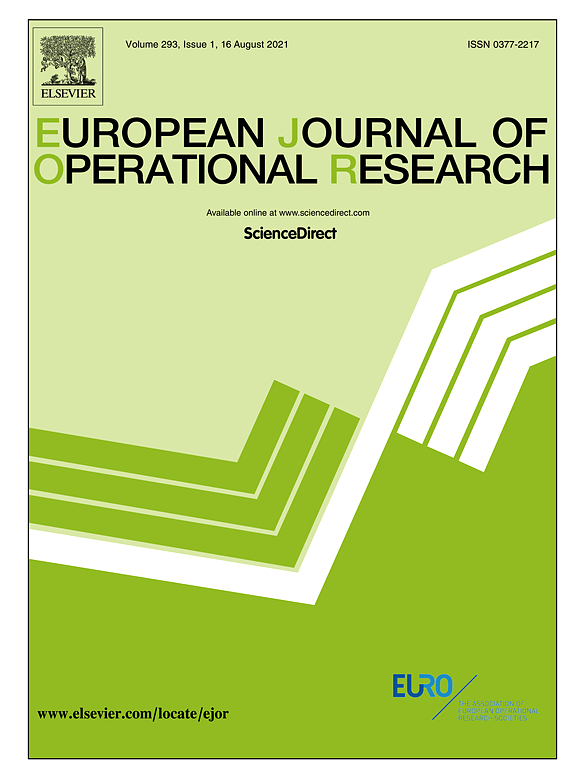Making a good career choice: A decision-analytical intervention to enhance proactive decision-making and career choice self-efficacy in high school students
At the end of high school, teenagers must deal with the first life-changing decision of determining what to do after graduation. For these decisions, adolescents need to be able to make good choices. However, most schools have not yet implemented decision training into their curricula. A new intervention called “KLUGentscheiden!” was developed to train complex decision-making in high school students to close this gap. The intervention targets three critical components of good decision-making: envisioning one’s objectives, identifying relevant alternatives, and comparing the identified alternatives by a weighted evaluation. We assumed that successfully training those decision-analytical steps should enhance self-perceived proactive decision-making skills. In addition, the training should also enhance self-assessed career choice self-efficacy. The intervention was evaluated in a pseudorandomized control study, including 193 high school students. The intervention group significantly increased proactive decision-making skills and career choice self-efficacy compared to the control group. Although different long-term evaluations are still…
“Smart decisions make you really happy”: MCI MOOC top-rated course on iMooX
Smart decisions make people really happy! Within the first nine months, 650 satisfied participants have already learned how to actively make them in our MCI MOOC “Smart Decisions” by Prof. Johannes Siebert. The MOOC is the best-rated course among over 100 courses on the iMooX platform and has a rating of 4.98 out of 5.00 stars. The core of the free MOOC consists of 8 interactive videos with a total length of just over 2.5 hours. In addition, more in-depth teaching materials, reflection exercises and quizzes are provided. Participants are also encouraged to work on their own running example(s). Prof. Siebert explains why many people make bad decisions and how they can avoid that. He presents some simple but effective methods based on recent developments in behavioral economics and decision sciences. The participants learn to make reflective and conscious decisions. Therefore, Prof. Siebert enables the participants to become their own…
How do I get clear about whether I want kids?
The ideal of a large family with children still exists. But many people today are unsure whether they really want that. They may be in their 20s or 30s, their friends are having babies, and they imagine what it will be like. They observe beaming but stressed parents. And they themselves haven’t made up their minds yet – because they’re actually quite happy with the way their lives are right now. At the same time, there’s the fear of missing out. How do you find out what’s right? Lisa Breit spoke with experts from various disciplines about this question: Johannes Siebert is a decision researcher, Melanie Hausler is a psychologist and happiness researcher, and Johannes Frass is a life coach and budding psychotherapist in Vienna. They explain how to make the decision and whether children really do make you happier. You can find the article in the Standard here: https://www.derstandard.at/story/2000137561015/wie-werde-ich-mir-klar-ob-ich-kinder-will
Supporting Innovation in Early-Stage Pharmaceutical Development Decisions
Pharmaceutical companies have frequent portfolio reviews to monitor development progress and prioritize development assets. The earliest assets are drug candidates whose efficacy is unknown and whose effects on the human body have yet to be fully investigated. These assets are characterized by a high degree of uncertainty in reaching the market and in being used in clinical practice. In addition, not all potential applications are foreseen and can often be very different. In the absence of satisfactory methods for making decisions on resource allocation among early development assets, decision makers focus almost exclusively on assessments of an asset’s probability of technical success. This study proposes a more holistic methodology to support early-stage pharmaceutical development decisions using value-focused thinking and multicriteria decision making. The methodology operates within the decision quality framework and provides a consistent evaluation of various early development assets across a diverse set of disease areas. This combination of…
The research project PerFake explores methods to reduce the influence of fake news on individuals
Fake news became a global phenomenon with the 2016 U.S. presidential election and the Brexit referendum, particularly because more and more people are using social media as a source of news without reflection. The spread of fake news on the Internet and its consequences are being intensively discussed in the European Parliament. Nevertheless, so far, there is no clear agreement on how to reduce the influence of fake news. „The problem with fake news is that even if it is flawlessly identified as such, something still „sticks“ – the fake news continues to influence our opinion”, explains Prof. Johannes Siebert, who researches and teaches at MCI | The Entrepreneurial School®. This phenomenon is called „belief perseverance bias“ and explains the great influence of fake news on the formation of opinion and the decision-making behavior of many people. „There are numerous newsrooms and nonprofit organizations that identify fake news. This very…
Fact checks can only be a first step
Fake news: a globalphenomenon with a negative impact on opinions. Professor Johannes Siebert from MCI and Dr. Jana Siebert from Palacky University Olomouc are fighting against this with their project “PerFake”. “Misinformation has always been a part of our society,” says Johannes Siebert. With the Brexit referendum and the 2016 U.S. presidential election, fake news – “misinformation deliberately spread to manipulate opinions,” the professor says – has become a global phenomenon. Ubiquitous. The spread of false facts has been aided in recent years by digital social networks, he said. In particular, by the fact that more and more people living in their Facebook bubble unthinkingly refer to it as a source for news. You can find the full interview here: https://www.unipress.at/wissenschaft/faktenchecks-koennen-nur-ein-erster-schritt-sein/
The luck of the wise decision
Very few people have learned how to make good decisions. Yet the ability to consciously find optimal decisions makes people happier in life. In the Standard, I explain how people can train themselves to make better decisions and, as a result, be more satisfied with their lives. Being self-determined means constantly making your own decisions. As we all know, these are not always the right ones. Afterwards, one is usually smarter, but then also often more frustrated, because what was actually planned did not occur. Johannes Siebert from the Management Center Innsbruck (MCI) and his team have proven this connection in several empirical studies: “We have shown in a structural equation model that those who have higher proactive cognitive abilities for decision-making are subsequently more satisfied with their lives,” Siebert reports. Such skills, which are necessary for making wise decisions in private life or at work, can be improved through…
How to make the better life decisions
Can we learn to make decisions in such a way that they positively influence developments in our private lives or in companies in the long term? Only if the character traits are right, says research. “A large proportion of companies make extremely poor decisions because they are unable to identify their objectives,” explains Johannes Siebert of Management Center Innsbruck (MCI). Only if the company’s objectives and values were defined could they be systematically pursued. If this does not happen, clinging to the status quo reigns instead of proactively initiating change. According to Siebert, making the right decisions is also the basis for entrepreneurial success. In Die Presse, I explain how people can make decisions and subsequently be more satisfied with their lives. Just follow this link. Sources Siebert, Johannes U.; Kunz, Reinhard, Rolf, Philipp. “Effects of decision training on individuals’ decision-making proactivity”, European Journal of Operational Research, 294 (1) 2021,…
Effects of Decision Training On Individuals’ Decision-Making Proactivity
Decision sciences are in general agreement on the theoretical relevance of decision training. From an empirical standpoint, however, only a few studies test its effectiveness or practical usefulness, and even less address the impact of decision training on the structuring of problems systematically. Yet that task is widely considered to be the most crucial in decision-making processes, and current research suggests that effectively structuring problems and generating alternatives—as epitomized by the concept of proactive decision making—increases satisfaction with the decision as well as life satisfaction more generally. This paper empirically tests the effect of decision training on two facets of proactive decision making—cognitive skills and personality traits—and on decision satisfaction. In quasi-experimental field studies based on three distinct decision-making courses and two control groups, we analyze longitudinal data on 1,013 decision makers/analysts with different levels of experience. The results reveal positive training effects on proactive cognitive skills and decision satisfaction,…
Developing and Validating the Multidimensional Proactive Decision-Making Scale
The crucial research questions are how their proactivity in decision situations can characterize individuals, the eventual consequences of proactivity in decision situations, and how the degree of proactivity affects satisfaction with one’s decisions. The scale on Proactive Decision Making (PDM) that has been theoretically developed from literature and empirically validated in cooperation with Prof. Reinhard Kunz (University of Cologne) allows for describing the degree of proactivity of individuals with six dimensions. Two dimensions cover proactive personality traits: ‘striving for improvement’ and ‘showing initiative’. The four dimensions ‘systematical identification of objectives’, ‘systematical identification of information’, ‘systematical identification of alternatives’, and “using a ‘decision radar’ concern proactive cognitive skills and integrate the ideas and concepts of value-focused thinking and decision quality into the PDM-scale. This scale provides the basis for analyzing many research questions. For instance, proactive individuals are significantly more satisfied with their decisions, and the scale can explain up to…
